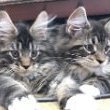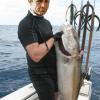Leaderboard
Popular Content
Showing content with the highest reputation on 09/02/2016 in Posts
-
The experiences related here are similar to my own. Last August 1 I started what turned out to be the most brutal cycle I ever experienced. Early on it became refractory to oxygen and I was travelling a bit so oxygen wasnt always there anyway. I had horded a significant amount of imitrex sq and prednisone and used it liberally. In retrospect I think that combination extended my misery. As we all Know this is a two edged sword trying to get relief while limiting exposure to treatments which can actually prolong the cycle (at least so it seems). Its always amazing to me how discombobulated treatment becomes in the throws of a bad cycle. Even if one has access to oxygen, imitrex, verapamil, mm, steroids, energy drinks, vit D, magnesium, hydration, antihistamines, depakote, lithium, topomax etc when the beast hits and doesnt behave as expected treatment plans change and one can perpetuate the cycle and personal physiology in very negative ways while seeking even just a few hours sleep. Sorry for the rant, we have all be there one way or another. My point is it seems very difficult to approach cycles and individual attacks in a reproducible systematic fashion. When the beast doesn't follow rules it makes it hard to develop a treatment strategy and is one of the reason doctors don't help too much. Medical training isn't so good at treating moving targets especially for rare non lethal conditions. That said, folks were talking about oral triptans and whether they are effective. Personally I have found 50-100 mg of imitrex at night will get me some much needed sleep if I have a big day coming up. Everything I read says it is not a prophylactic but my experience is strongly contrary. There is a price to pay of course, rebound can be a problem and its easy to get toxic on the meds but at least I get through work the next day. There is a study looking at naratriptan (Amerge) as a prophylactic to break a cycle. It is a long acting, long onset of action version of imitrex and the study showed some positive results using once or twice a day. I tried it with my last cycle before it finally broke and plan to try it again if I break through my mm schedule. Of course this med is more expensive and formulary restricted by some plans even though a generic is available. The bottom line with this ramble is if all you got is oral triptan and you need some relief they can help just not in an acute attack. Caffeine, fluids, exercise seem better in the throws of attack. I wish prayer helped but it never has. As always these are personal observations, opinions and thoughts. Each person is unique in resources and response.1 point
-
TRIGGERS Many people with CH don’t recognize all the triggers that can bring on an attack. Some participants at the ClusterBusters message board put together this list of their triggers. Not all of these items are triggers for everyone, but we urge you to look over this list to see whether there might be something you are missing. Here are some comments that might encourage you. “It took me a long time to make the connection that I got hit not long after eating chocolate. When I stopped, those hits went away.†“For years I couldn’t understand why I got a headache 30 minutes after I left work regardless of what time I left. I was blaming the dusty atmosphere until I read that relaxation was a trigger. It was an epiphany!†“My ED meds! Who knew?†“I learned the hard way about epinephrine when used as a dental anesthetic. I thought it was the dental work itself that triggered me.†“MSG (monosodium glutamate) is a huge trigger for me, and it is in a lot of foods, such as many soups, flavored chips, and cold cuts. Reading labels carefully has made a very big difference for me.†If you have additional triggers to add, or comments to make, please visit the “ClusterBuster Files†message board at www.clusterbusters.org. Atmospheric Conditions Barometric pressure changes High pollen counts (taking Benadryl along with the Vitamin D3 regimen can help with this one) High temperatures Events and Activities Airplane travel Dental work (When using anesthetics that are triggers. Anesthetics containing epinephrine (such as Xylocaine) and nitrous oxide have been identified by some people as triggers. Ask your dentist to use something else: Prilocaine seems not to cause bad effects.) Foods and Beverages Alcoholic drinks Aspartame (artificial sweetener) BBQ Sauce Caffeine at the wrong time [“My belief that the body maintains stasis when ‘insulted’ continuously....so best to withhold caffeine until needed for maximum effect.â€] Cheeses that are fermented [“Bleu, brie, American, Swiss etc.â€] Chocolate Flour, bleached white (white bread, cake etc.) Histamines [“Most of the food items on this list release histamine in your body. A low-histamine diet helped me a lot!â€] MSG (monosodium glutamate, a food additive found in many products—see additional information at the end of this list) Nitrates and nitrites (often added to processed meats, such as bacon, hot dogs, jerky, and luncheon meats) Shrimp Sugar: high-sugar foods Locations Altitude: high-altitude locations; travel from high altitude locations to lower ones and from lower ones to higher ones Medical conditions Illness [“Any time I get sick I get hits.â€] Low blood sugar Medications and Supplements Amoxicillin Amyl nitrate (used medically to treat heart diseases such as angina, and also used as an inhalant drug, often called a “popper,†that induces a brief euphoric state) Epinephrine (anesthetic used often in dental work; see discussion under “Events and Activitiesâ€) Erectile dysfunction medications (Viagra, Cialis) Marijuana Nitroglycerine Nitrous oxide [“Dental anesthesia...never experienced personally...but an enlightened anesthesiologist I met told meâ€] Odors Burning leaves Gasoline Paint Perfumes Smoke Solvents Welding fumes (zinc welding fumes was an INSTANT hit for me) Personal Habits and Activities Changes in routines (eating, sleeping, exercise, etc.) Gum chewing, or excessive jaw movements Strenuous exercise Sleep, Rest, and Relaxation Baths [“Showers have never triggered a cluster for me. It’s about the relaxation.â€] Irregular sleep schedule [“Any change in sleep patterns, especially if I am startled awake.â€] Napping Relaxing [“For years I couldn’t understand why I got a headache 30 minutes after I left work regardless of what time I left. I was blaming the dusty atmosphere until I read that relaxation was a trigger. It was an epiphany!â€] Stress and post-stress [“Coming home from work, finishing a stressful project.â€] Taking a bath Additional Information About MSG (Monosodium Glutamate) Many people with CH experience MSG as a trigger. As noted above, MSG appears in many prepared foods, which can include broths and soups, flavored chips, cold cuts, frozen dinners, and ranch dressing. It is a standard ingredient in Chinese restaurant food, but other restaurants may use it, too. You might want to ask and to order food without MSG if it’s a trigger for you. One person provided the following information: “MSG hides in our food supply under many guises. I’d add a caution to research glutamic acid content of foods...same action in the body as MSG. Examples of higher levels include anchovies, tomatoes and mushrooms........ Other Names for MSG: The A to Z Guide: Accent (food additive) Autolyzed Plant Protein Autolyzed Yeast Aginomoto Calcium Caseinate Citric Acid (when processed from corn) Gelatin Glutamate Glutamic Acid Hydrolized Plant Protein (HPP) Hydrolized Vegetable Protein (HVP) Monopotassium Glutamate Monosodium Glutamate MSG Natural Flavoring Natural Meat Tenderizer Sodium Caseinate Senomyx (wheat extract labeled as artificial flavor) Textured Protein Yeast Food or Nutrient Yeast Extract â€1 point


